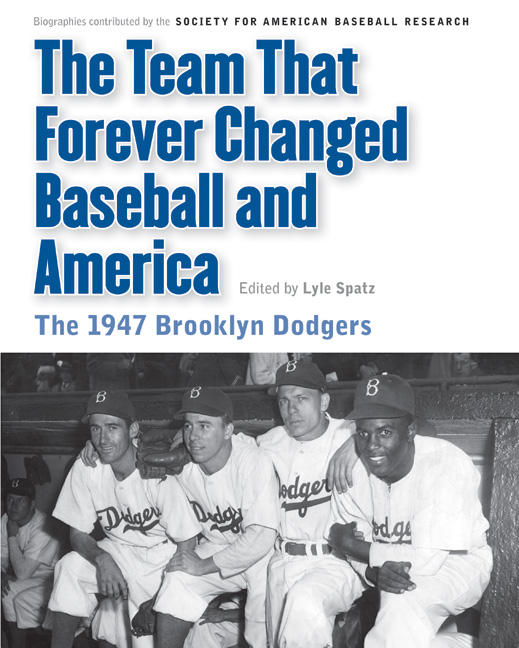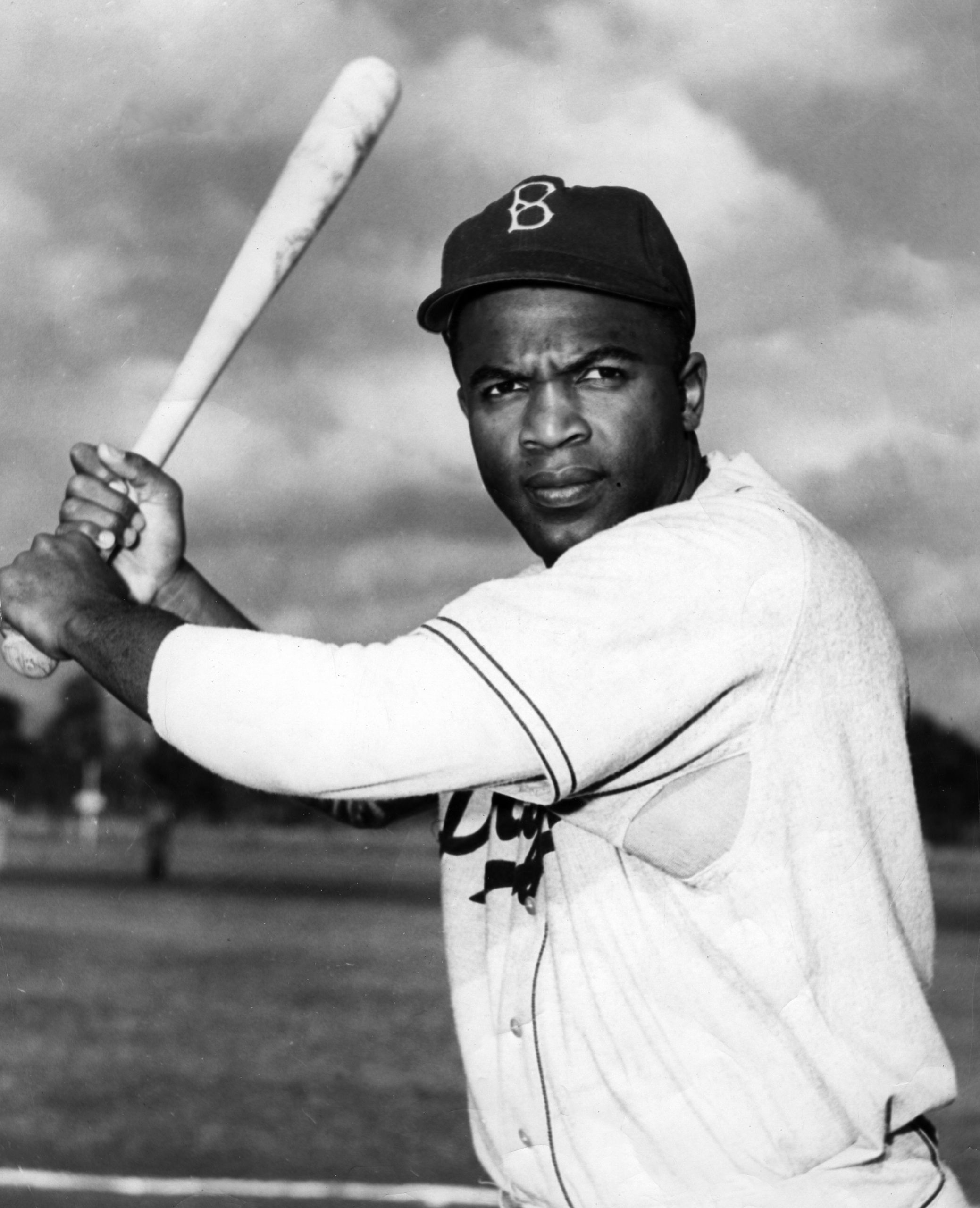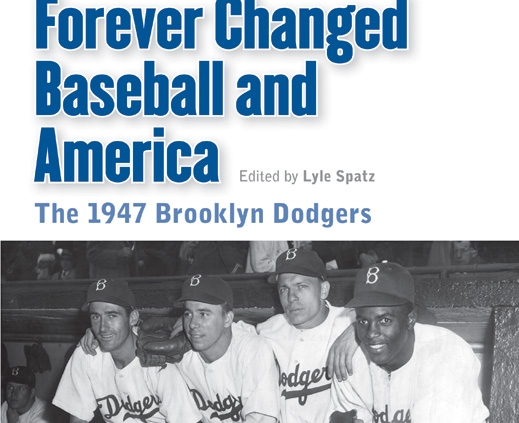1947 Dodgers: Jackie Robinson’s First Game
This article was written by Lyle Spatz
This article was published in 1947 Brooklyn Dodgers essays
 Jackie Robinson’s major-league debut was more than just the first step in righting an historical wrong. It was a crucial event in the history of the American civil rights movement, the importance of which went far beyond the insular world of baseball.
Jackie Robinson’s major-league debut was more than just the first step in righting an historical wrong. It was a crucial event in the history of the American civil rights movement, the importance of which went far beyond the insular world of baseball.
The Dodgers signed Robinson to a major league contract just five days before the start of the 1947 season. Baseball people, especially those in Brooklyn, were still digesting the previous day’s news of manager Leo Durocher’s one-year suspension (for conduct detrimental to baseball), when the story broke of Robinson’s promotion from the Montreal Royals. He would be the first black American to play in the major leagues since catcher Fleetwood Walker played for the Toledo Blue Stockings of the American Association back in 1884.
Robinson had played second base for the International League’s Montreal Royals in 1946, but on orders from the Dodgers he had been working out at first all spring. He played first base in Brooklyn’s final three exhibition games against the Yankees, and again two days later when the Dodgers opened the season at Ebbets Field against the Boston Braves. Rumors of a sellout may have discouraged some fans from attending, but whatever the reason, a crowd of only 26,623 saw Robinson’s debut.
Jack made the game’s first putout, receiving the throw from fellow rookie Spider Jorgensen on Dick Culler’s ground ball to third base. Interim manager Clyde Sukeforth had Robinson batting second, so after Eddie Stanky grounded out, Jack stepped in against Johnny Sain for his first major league at-bat. Sain, the National League’s winningest right-hander in 1946, retired him easily on a bouncer to third baseman Bob Elliott. After flying out to left fielder Danny Litwhiler in the third inning, Robinson appeared to have gotten his first big league hit in the fifth. But, shortstop Culler made an outstanding play on his ground ball and turned it into a well-executed 6-4-3 double play.
 When he next batted, in the seventh, Brooklyn was trailing, 3–2. Stanky was on first, having opened the inning by drawing Sain’s fifth walk of the afternoon. It was an obvious bunt situation and Robinson laid down a beauty, pushing the ball deftly up the right side. Boston’s rookie first baseman, Earl Torgeson, fielded it, but with Robinson speeding down the line, he was forced to hurry his throw. The ball hit Jack and caromed away, allowing him to take second and Stanky to reach third. Pete Reiser’s double scored both runners and finished Sain. Reiser later scored on Gene Hermanski’s fly ball off reliever Mort Cooper as the Dodgers won 5–3. Hal Gregg, in relief of starter Joe Hatten, got the win, and Hugh Casey got the first of his league-leading eighteen saves. Of course nobody had ever heard of “saves” in 1947, and Casey would die never knowing that he had twice been the National League leader.
When he next batted, in the seventh, Brooklyn was trailing, 3–2. Stanky was on first, having opened the inning by drawing Sain’s fifth walk of the afternoon. It was an obvious bunt situation and Robinson laid down a beauty, pushing the ball deftly up the right side. Boston’s rookie first baseman, Earl Torgeson, fielded it, but with Robinson speeding down the line, he was forced to hurry his throw. The ball hit Jack and caromed away, allowing him to take second and Stanky to reach third. Pete Reiser’s double scored both runners and finished Sain. Reiser later scored on Gene Hermanski’s fly ball off reliever Mort Cooper as the Dodgers won 5–3. Hal Gregg, in relief of starter Joe Hatten, got the win, and Hugh Casey got the first of his league-leading eighteen saves. Of course nobody had ever heard of “saves” in 1947, and Casey would die never knowing that he had twice been the National League leader.
When the Dodgers took the field in the ninth inning, Robinson remained on the bench as veteran Howie Schultz took over at first base. Sukeforth had inserted Schultz as a defensive measure, but the Dodgers soon realized that Robinson needed no help. Schultz played in only one more game before Brooklyn sold him to the Phillies. Ed Stevens, the team’s other first baseman, played in just five games before he was sent back to the minors.
The popular Pete Reiser, coming back from yet another injury, clearly had been the star of the game, and it was he, not Robinson, who was the focus of the story in the next day’s New York Times. Roscoe McGowen’s game account mentioned Robinson only in relation to his play, leaving columnist Arthur Daley to take note of his debut, which he called uneventful. In retrospect, it would be easy, and fashionable, to attribute the writers’ casual treatment of this history-making game to racism. However, I prefer to think that they handled it in this way because it took place at a time when baseball reporters believed that that’s what they were: baseball reporters, men who felt their sole duty was to report what took place on the field. Red Barber and Connie Desmond, the Dodgers’ radio broadcasters did the same. The mind boggles to think how the media would cover such an event today.
LYLE SPATZ is the editor of “The Team That Forever Changed Baseball and America: The 1947 Brooklyn Dodgers”, the first book in SABR’s “Memorable Teams in Baseball History” series with the University of Nebraska Press. This chapter evolved from the author’s presentation at the “Jackie Robinson: Race, Sports, and the American Dream” conference held at the Brooklyn campus of Long Island University on April 3-5, 1997.


